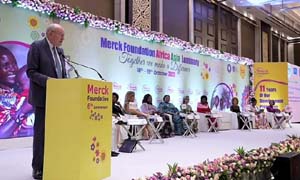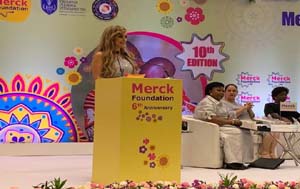By JESSIE NGOMA-SIMENGWA –
OCTOBER is an awareness month that has been chosen to feature an annual international health campaign organised by major breast cancer charities and other stakeholders.
It is also known as a Pink Month, where efforts to educate those concerned about the disease are stepped up.
The campaign emphasises early identification of the signs and symptoms associated with breast cancer, and stresses the importance of regular screening.
According to the International Agency for Research on Cancer, the annual number of new cancer cases in Africa will grow to more than one million.
One organisation helping to train doctors in oncology so they can diagnose early, treat and manage cancer in Africa, Asia and beyond is the Merck Foundation.
Beyond Africa, India, due to its advanced technology, has been providing treatment to many Zambian cancer patients.
Zambia can also learn how India is treating and managing cancer patients through the Merck Foundation and its partners.
Recently, the organisation held its 10th Edition Luminary to unfold its strategies and the impact of partnership programs in building health care capacity.

Prof. Frank Stangenberg-Haverkamp, chairman of both executive Board of E. Merck KG and Merck Foundation, acknowledged the foundation’s alumni from 50 countries.
He did so during his opening speech at the 10th Edition of the Merck Foundation Africa Asia Luminary that was recently held in Mumbai, India.
Prof. Haverkamp said he was proud of the success of scholarships that the doctors and many others in different academia had undertaken as they are the future healthcare experts of their countries.
He also recognised the outstanding and important contribution that Merck Foundation was making towards transforming the patient landscape in many countries across Africa.
He said the foundation has so far provided more than 1,700 scholarships to young doctors from 50 countries in 42 critical and underserved specialities such as rheumatology oncology and diabetes, endocrinology, cardiovascular, fertility care and many others.
The professor said many of these scholarships were conducted in India where clinical training is provided through their partners like Tata Memorial Centre, and Manipal University.
Prof. Haverkamp also noted that many of the Merck Foundation Alumni have since become the very first specialist especially in the field of Oncology and fertility care in their countries.
“I strongly believe that improved access to quality and equitable healthcare results in a nation’s well-being, fostering economic growth can transform the lives of individuals and improve overall health and productivity,” he said.
He said currently, the major need for Africa in addressing the burden of cancer is access to high quality cancer management services and also shortage of human resource.
Notably, there is need to equip healthcare workers with the appropriate tools and knowledge to deliver best practice against cancer care.
This entails that African countries must provide capacity building expertise among health care professionals to recognise the early signs and symptoms of cancer.
In addition, appropriate early detection of cancer by health personnel with safe administration of chemotherapy and other treatment modalities must be made available.
For instance, cervical cancer in Zambia ranks as the most frequent among women of reproductive age but it is also one of the most preventable types of cancer.

Zambian doctors have benefitted from the training and scholarships that Merck Foundation has so far offered.
And CEO of Merck Foundation Dr Rasha Kelej said the conference was held so that it could meet and discuss strategies for health care solutions.
Dr Kelej, who chaired the conference, said the aim was to contribute and improve access to quality and equitable healthcare solutions.
“We are also was marking the cancer awareness month hence, the wearing of the pink ribbon today,’’ she said. She also said the foundation was commemorating two important milestones, which the 6th Anniversary and 11th Anniversary for Merck Foundations development initiatives in Africa, Asia and underserved communities.
She said Merck Foundation was making history and a legacy in Africa by training some doctors as first specialists in some medical fields.
Dr Kelej said partners such as the African first ladies are ambassadors of Merck Foundation and instrumental together with their ministries of Health in their respective countries.
The success story of Merck Foundation has been a rewarding journey that is transforming the lives of people in the most disadvantaged communities in Africa,
Asia and beyond.
In Zambia, the burden on services at Cancer Diseases Hospital (CDH) in Lusaka the only centre offering specialist cancer care has continued to grow.
And director at Tata Memorial centre institution thanked Merck Foundation for giving them the opportunity to interact with Africa.
Dr Rajendra Badwe said it was a learning experience of exchanging knowledge as India has learnt a lot from what is happening in Africa and in sharing their skill through training.
“As part of our training programme, the centre has provided training to many individuals across Africa and sponsored scholarships from the ministry of external affairs. In the last 10 years, we have trained more than more 200 individuals with 130 of them as part of Merck Foundation activities,” he said.
He said the hall mark or success of the training is essentially what is learnt from Tata hospital and later implementable in their home countries to help local individual patients.
Dr Badwe shared some of the experiences India has used before starting a cancer hospital, and said a cancer registry was one of them, as this helped them to gauge the magnitude of the problem. Tata hospital was identified as a hub for training of cancer registration.
Another aspect he raised was to look at the effects and trends of what has been implemented at the clinical and population level so as to understand all the aspects.
“We need to train individuals in major areas that form the pillar of management of cancer such as radiation oncology, surgical oncology, medical oncology and pathology. Without these four, it is not possible to treat and manage cancer. In addition, cancer nursing is also a special component in palliative care,’’ he explained.
Dr Badwe said there was also need for a delivery system that will look after the whole spectrum of cancer care, thus the need to implement the model.
The Luminary was held through a hybrid model which attracted over 10,000 participants, including healthcare providers, policy makers, and researchers.
Like many other developing countries in Africa, Zambia still faces a shortage of trained healthcare providers.
Therefore, enhancing the training of oncologists through Merck Foundation will help in distribution of healthcare providers involved in cancer care.






